Ethereum wallets are a must-have tool for managing your digital assets. As the crypto space is evolving, choosing the right wallet becomes more important than ever. In 2025, the best ethereum wallets combine security, ease of use, advanced features, and advanced security features. A wallet’s interface is key to user-friendliness, making it easier for beginners to manage their crypto. Additionally, the wallet’s intuitive interface ensures that both novice and experienced users can navigate the multi-platform environment with ease.
Whether you’re new to crypto or a seasoned investor, finding the perfect ethereum wallet can be tough. This guide will help you navigate the options, focusing on top contenders like Best Wallet, MetaMask and Ledger Nano S.
What is an Ethereum Wallet?
An Ethereum wallet is a digital tool that lets you manage your Ethereum-based assets. Creating an Ethereum wallet involves creating an Ethereum account which generates a unique wallet address. These ethereum wallets are essential for anyone looking to interact with the Ethereum blockchain. They allow you to store, send and receive Ether (ETH) and other ERC-20 tokens securely.

Ethereum wallets come in different forms, mobile apps, browser extensions and hardware devices. Each type offers different levels of security and convenience. For example, hardware wallets like Ledger are considered highly secure as they store your crypto offline, away from online threats.
The Importance of Ethereum Wallets
You need an Ethereum wallet to participate fully in the Ethereum ecosystem. Here’s why:
- Control: Wallets give you full control over your digital assets.
- Security: They keep your private keys safe, especially hardware wallets.
- Access: You can interact with decentralized applications (dApps) and smart contracts.
- Management: Wallets allow you to view and manage multiple Ethereum accounts.
Remember when choosing among top ethereum wallets consider factors like security features, user interface and compatibility with your devices. Your wallet is your gateway to the Ethereum network, choose wisely to ensure safe and efficient management of your digital assets.
Types of Ethereum Wallets – Which One Suits You Best?
Ethereum wallets come in different forms, each designed for different user needs. Understanding these types will help you choose the best ethereum wallet for your crypto journey.
8 Best Ethereum Wallets for 2025 – Reviewed and Compared
Choosing the right Ethereum wallet is crucial for managing your digital assets securely. Let’s explore some of the top ethereum wallets that stand out in 2025, offering a blend of security, functionality and user-friendliness.
| Wallet | Type | Assets Supported | Unique Feature |
|---|---|---|---|
| Best Wallet | Multi-chain | 50+ blockchains | Built-in DEX |
| MetaMask | Web 3 | 5,000+ tokens | dApp integration |
| Ledger Nano S | Hardware | 5,500+ assets | Bluetooth connectivity |
| MyEtherWallet (MEW) | Web-based | Ethereum & ERC-20 tokens | Full private key control |
| Trezor Model T | Hardware | 1,000+ cryptocurrencies | Touchscreen display |
| Exodus | Software | 100+ cryptocurrencies | Built-in portfolio tracker |
| Trust Wallet | Mobile | Ethereum & 100+ others | Built-in DApp browser |
| Guarda Wallet | Multi-platform | 50+ cryptocurrencies | Hardware wallet integration |
1. Best Wallet – The Most Popular Ethereum Wallet
Best Wallet is a non-custodial, multi-chain Ethereum wallet known for its user-friendly interface and robust security features. Available as a mobile app for both iOS and Android, it allows management of Ethereum and many other cryptocurrencies. The wallet supports over 50+ blockchains, so you can handle various tokens and NFTs in one platform.
Security is top priority for Best Wallet with 2FA, biometric verification and decentralized account recovery to protect your assets. It also has a built-in DEX aggregator for direct token swaps and cross-chain transactions with competitive rates and low fees. You can also buy and sell cryptocurrencies within the app for a seamless experience.

The platform’s native token, $BEST, plays a central role in its ecosystem, offering holders benefits such as reduced transaction fees, staking rewards, and exclusive access to partner token launches. Users can also participate in staking and other DeFi activities through the wallet, enhancing their earning potential.
The $BEST token plays a central role in the ecosystem and offers holders reduced transaction fees, staking rewards and exclusive access to partner token sales. You can also stake and participate in DeFi activities through the wallet to increase your earnings.
Follow Best Wallet’s social media channels, including Telegram group to stay updated with the latest news and community updates.
Key Features of Best Wallet:
- Multi-Chain – Support Ethereum and 50+ blockchains.
- Advanced Security – 2FA, biometric login and decentralized account recovery.
- Built-in DEX Aggregator – Direct token swaps and cross-chain transactions with low fees.
- Fiat On/Off Ramp – Buy and sell crypto within the app.
- DeFi & Staking – Earn rewards through staking and DeFi activities.
- $BEST Token Utility – Reduces fees, provides staking rewards and exclusive access to token sales.
2. MetaMask – The Most Popular Web3 Wallet
MetaMask is one of the most widely used Ethereum wallet, a browser extension and a mobile app. It allows you to store, send and receive Ethereum and ERC-20 tokens while interact with decentralized applications (dApps).

With its simple interface and wide compatibility, MetaMask is a great choice for both beginners and experienced users.
Kes Features of MetaMask:
- Browser Extension & Mobile App – Chrome, Firefox, Edge, Brave, iOS and Android.
- dApp Integration – Access to Ethereum-based dApps.* Multi-Chain Support – Connect to multiple Ethereum-compatible chains, including Polygon, Binance Smart Chain and Arbitrum.
- Token Management – Ethereum and ERC-20 tokens, custom token support.
- Swaps & Fiat On-Ramp – Built-in token swaps and buy crypto with fiat.
- Security Features – Private key encryption, password protection and hardware wallet integration.
3. Ledger Nano S – Best Hardware Wallet for Security
Ledger Nano S is a secure hardware Ethereum wallet designed to store Ethereum and other cryptocurrencies offline. As a cold storage solution, it keeps private keys away from online threats, perfect for long-term holders who prioritize security.
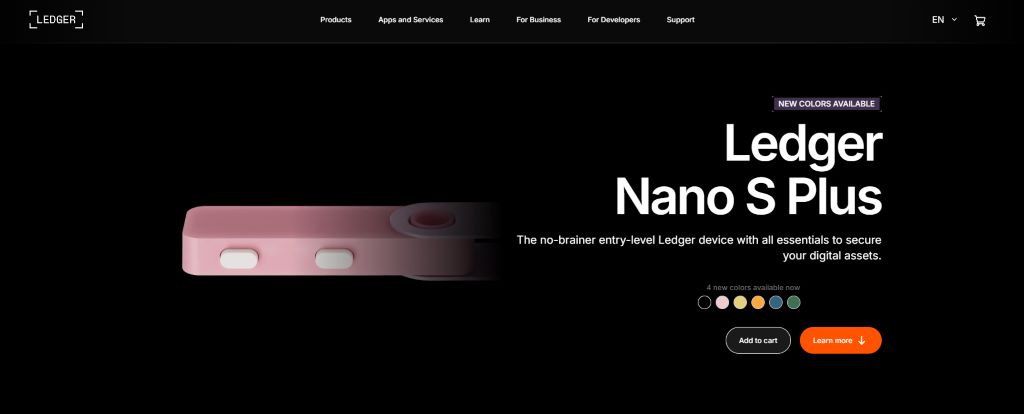
Although small, it supports many assets and integrates with popular wallets and dApps.
Key Features of Ledger Nano S:
- Cold Storage – Private keys are offline, safe from hacking and malware.
- Multi-Currency – Ethereum, Bitcoin and 5,500+ other cryptocurrencies.
- Secure Chip – Certified secure element (CC EAL5+) to prevent unauthorized access.
- Backup and Recovery – Create a recovery phrase to restore funds if lost or damaged.
- DApp & DeFi – Connect to wallets like MetaMask to access dApps.
- USB Connection – Simple plug-and-play setup via USB for transactions and management.
4. MyEtherWallet (MEW) – Open-Source Ethereum Wallet
MyEtherWallet (MEW) is an open-source Ethereum wallet that allows users to create, manage and interact with Ethereum assets securely. As a non-custodial wallet, MEW gives users full control over their private keys and a user-friendly interface for crypto management.
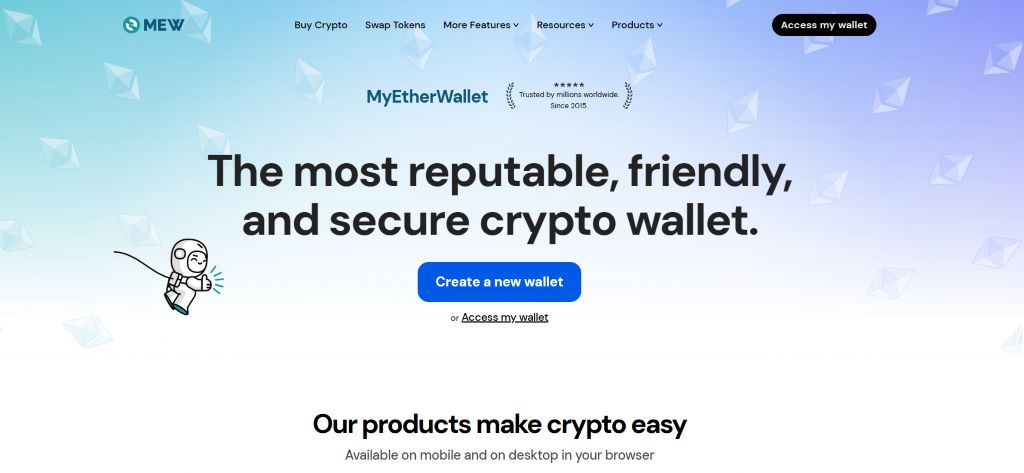
It supports ERC-20 tokens, smart contracts and hardware wallet integration for extra security.
Key Features of MyEtherWallet (MEW):
- Private Key Control – Users have full ownership and control over private keys.
- Multi-Platform – Web-based and mobile app (MEW Wallet).
- Token Compatibility – Ethereum and all ERC-20 tokens.
- Hardware Wallet Integration – Ledger Nano S, Trezor and other hardware wallets.* Built-in Swap & DeFi – Token swaps and DeFi protocol interaction.
- Ethereum Name Service (ENS) Support – Register and manage .eth domain names.
5. Trezor Model T – Cold Storage
Trezor Model T is a premium hardware wallet for storing Ethereum and other cryptocurrencies. Known for its security, it has a color touchscreen display for transaction verification and a PIN code to access your wallet.
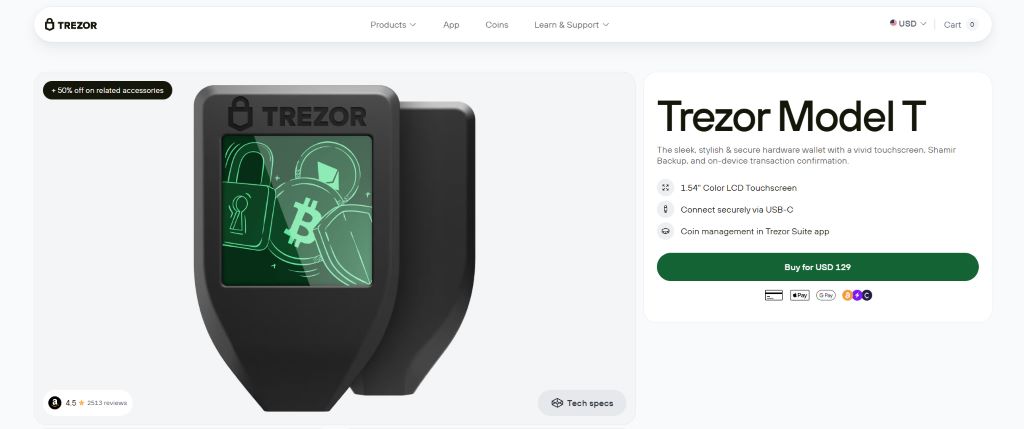
It’s one of the best for users who want robust asset protection.
Key Features of Trezor Model T:
- Touchscreen – Color touchscreen for navigation and secure transaction verification.
- Passphrase – Add an extra passphrase for physical theft protection.
- Password Manager – Built-in password manager to store and protect login credentials.
- Multi-Currency – Ethereum and over 1,000 other cryptocurrencies.
- Secure Chip – Secure element chip for private keys and access control.
- Backup & Recovery – Recovery seed for easy backup and restore.
6. Exodus – Best for Beginners
Exodus is a desktop and mobile wallet for managing cryptocurrencies, including Ethereum. Its wallet’s intuitive interface makes it perfect for beginners and experienced users.
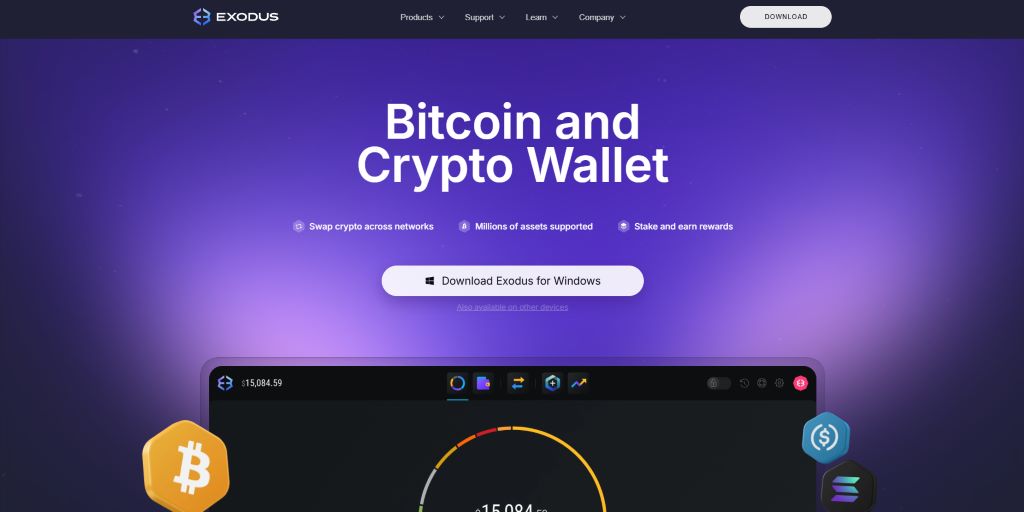
Exodus has built-in security features like wallet backup and a seamless crypto trading experience with its integrated exchange.
Key Features of Exodus:
- Portfolio Tracker – Built-in portfolio tracker to monitor and manage your crypto.
- Exchange Integration – Swap cryptocurrencies directly within the wallet through integrated exchanges.
- Customer Support – 24/7 customer support for any wallet issues.
- Multi-Currency – Ethereum and over 100 other cryptocurrencies.
- Security – Backup feature and private key encryption.
- Easy-to-Use – Simple and beautiful design for a smooth experience.
7. Trust Wallet – Multi-Crypto Mobile Wallet
Trust Wallet is a mobile wallet for storing and trading Ethereum and other cryptocurrencies directly from your smartphone. It’s a decentralized platform for secure storage and trading with a user-friendly interface.
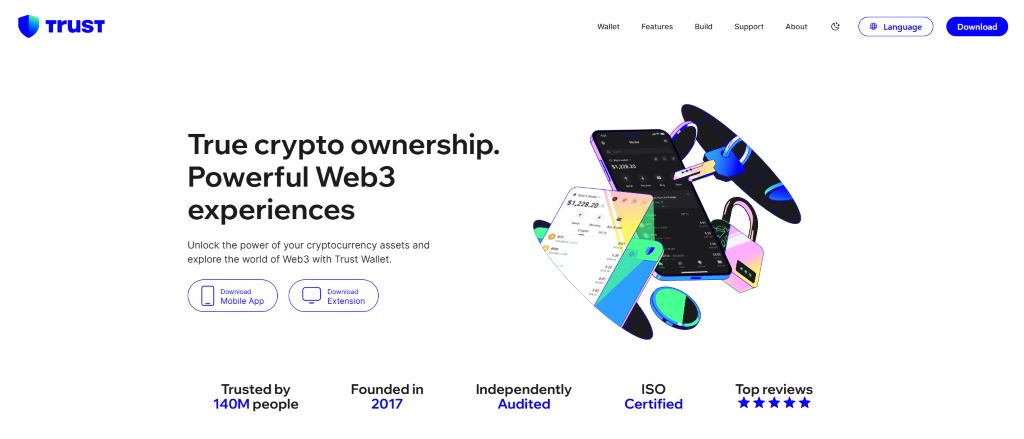
Trust Wallet supports many cryptocurrencies making it a good option for those with multiple assets.
Key Features of Trust Wallet:
- Mobile – Available for iOS and Android, access your wallet anywhere.
- DApp Browser – Built-in browser for direct DApp interaction.
- Biometric Authentication – Secure your wallet with biometric methods like fingerprint or face recognition.
- Multi-Currency – Ethereum, ERC-20 tokens and many other cryptocurrencies.
- Staking – Stake certain cryptocurrencies directly from the wallet to earn rewards.
- Integrated Exchange – Swap between supported cryptocurrencies.
8. Guarda Wallet – Secure and Flexible
Guarda Wallet is a non-custodial wallet for managing Ethereum and many other cryptocurrencies. User-friendly and available on desktop, mobile and web, you can manage your digital assets on any device. By keeping your private keys, you’re the only one who has access to your Ethereum and other cryptocurrencies.

Guarda doesn’t require any personal information making it a preferred choice for users who value privacy and anonymity.
Key Features of Guarda Wallet:
- Multi-Currency – Store, send, receive and manage Ethereum and many other cryptocurrencies in one place.
- Integrated Exchange – Swap cryptocurrencies within the wallet without third-party exchanges.
- Hardware Wallet Integration – Connect with hardware wallets for enhanced security.
- Token Generation – Create your own tokens on supported blockchain networks like Ethereum and Binance Smart Chain.
- Non-Custodial – You keep full control over your private keys and funds.
Things to Consider when Choosing an Ethereum Wallet
Choosing the right Ethereum wallet is crucial for your digital assets. When evaluating ethereum wallets consider these key factors to find the best ethereum wallet for you.
Security should be your number one priority. Look for wallets with 2FA and encryption. Hardware wallets like Ledger Nano S are more secure as they store private keys offline and are not vulnerable to online threats.
Backup and recovery options are important. Make sure your chosen wallet has a secure way to backup your recovery phrase. This 12 to 24 word phrase is your lifeline if you lose access to your wallet.
Don’t forget customer support. Good support can be very helpful when navigating the complexities of ethereum wallets and Ethereum blockchain.
| Factor | Best Wallet | MetaMask | Ledger Nano S |
| Security | High | Medium | Very High |
| Ease of Use | High | High | Medium |
| Multi-currency Support | Yes | Limited | Extensive |
| DeFi Integration | Good | Excellent | Good |
| Backup Options | Yes | Yes | Yes |
How to Create an Ethereum Wallet
Creating an Ethereum wallet is a quick process that takes a few minutes. This guide will help you create and secure your wallet to manage ETH and other Ethereum-based assets.

First choose a wallet type. Software wallets are popular for active users, hardware wallets for long term holders. Creating an Ethereum wallet involves generating a unique address starting with “0x” for sending and receiving tokens.
Follow these steps to set up your wallet:
- Download a reputable wallet app or purchase a hardware device
- Create an account with a strong password
- Generate and securely store your 12-word recovery phrase
- Set up additional security features like two-factor authentication
- Add Ethereum or ERC-20 tokens to your wallet
Remember security is key. 60% of users prioritise security over ease of use when choosing ethereum wallets. Make sure you back up your private keys and recovery seed phrase – 80% of users don’t do this properly and risk losing access.
| Wallet Type | Security Rating | User-Friendliness | Accessibility |
| Software | 6/10 | 8/10 | 100% |
| Hardware | 9/10 | 6/10 | 50% |
| Paper | 10/10 | 3/10 | 30% |
Choose the wallet that best fits your needs. Top ethereum wallets offer a balance of security and usability, ensuring safe and convenient management of your digital assets.
Custodial vs Non-Custodial Wallets – Which one is better?
When choosing ethereum wallets you’ll come across two main types: custodial and non-custodial. The best ethereum wallet for you depends on your priorities and comfort level with your crypto assets.
Custodial wallets are managed by third parties like exchanges. They handle security and key management, making them user-friendly. But you don’t have full control over your funds. Examples include Binance and BitMex.
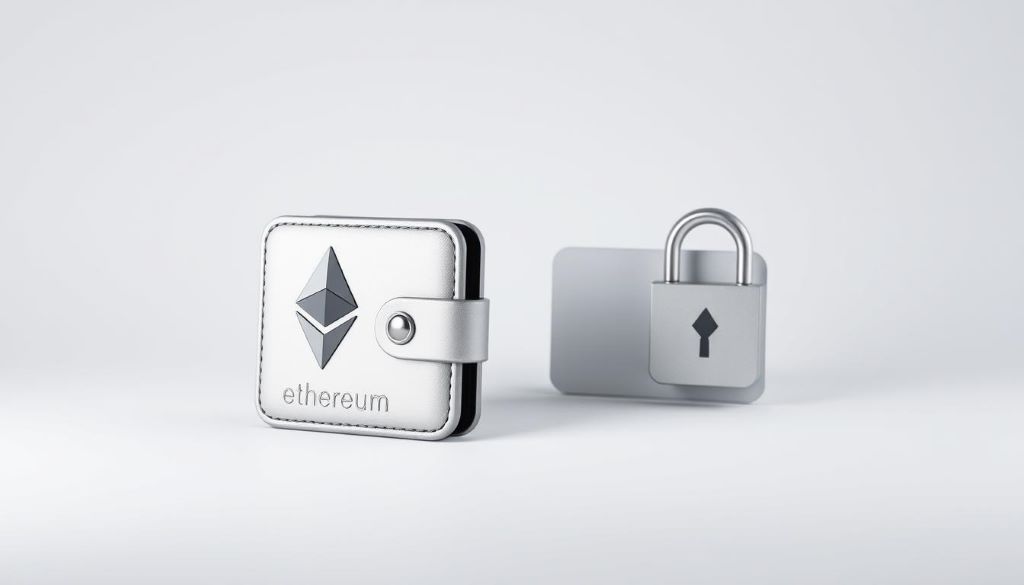
Non-custodial wallets give you full control over your private keys and funds. This includes popular options like Best Wallet, MetaMask and Ledger Nano S. While they requires more responsibility, they offer more security and privacy.
Custodial wallets are more vulnerable to hacks. The Mt. Gox incident in 2014 resulted in a $450 million loss. Non-custodial wallets, especially hardware ones like Ledger Nano S are considered the safest for storing private keys.
Your choice between custodial and non-custodial ethereum wallets should match your security needs, technical skills and control preferences. Both have their place in the crypto ecosystem, catering to different user requirements.
Conclusion – Which Ethereum Wallet Should You Use?
Choosing the best Ethereum wallet depends on your unique needs and preferences. With Ethereum’s market cap of $231 billion and daily trading volume of $30 billion, securing your ETH is important. The top Ethereum wallets have different features to suit different users.
Best Wallet stands out for its multi-chain support on over 50 blockchains and 200 decentralized exchanges. MetaMask is the user-friendly Web3 wallet for those diving into decentralized applications. For maximum security the Ledger Nano S hardware wallet supports over 5,500 cryptocurrencies and uses advanced encryption.
When choosing your Ethereum wallet consider security, ease of use and supported features. Hardware wallets are the safest for long term storage, software wallets for frequent transactions. Always back up your seed phrase and follow best security practices to protect your digital assets.In the end the best Ethereum wallet is the one that suits your crypto goals and usage. Whether you prefer multi-chain support, security or user-friendliness, there’s a top Ethereum wallet for you. Take the next step in your crypto journey by choosing a wallet that fits your needs and securely manages your Ethereum assets.
FAQ
What is an Ethereum wallet?
An Ethereum wallet is a digital tool that allows you to store, manage and interact with Ethereum and ERC-20 tokens. It stores your private keys securely and allows you to send, receive and monitor your cryptocurrency assets on the Ethereum blockchain.
Why do I need an Ethereum wallet?
You need an Ethereum wallet to participate in the Ethereum ecosystem, including using decentralized applications (dApps), engaging in DeFi protocols and trading NFTs. It provides a secure way to manage your Ethereum assets and offers more control and security than keeping your funds on an exchange.
What’s the difference between hot and cold wallets?
Hot wallets are connected to the internet and are for frequent transactions. Cold wallets like hardware wallets are offline storage solutions for long term storage. Hot wallets are web, mobile and desktop applications, Ledger Nano S is an example of a cold wallet.
Is MetaMask good for beginners?
Yes, MetaMask is good for beginners due to its user-friendly interface, wide adoption and seamless integration with many dApps and DeFi platforms. It’s available as a browser extension and mobile app, so it’s accessible for everyone.
How secure is Ledger Nano S?
Ledger Nano S is highly secure as it stores your private keys offline in a hardware device. It has a secure element chip, Bluetooth connectivity for mobile use and requires physical confirmation for transactions, it’s one of the most secure options for storing Ethereum and other cryptocurrencies.
What makes Best Wallet stand out among Ethereum wallets?
Best Wallet stands out for its multi-chain support, built in decentralized exchange (DEX) and user-friendly interface. It’s a comprehensive solution for managing multiple cryptocurrencies beyond Ethereum, so it’s a good choice for users involved in multiple blockchain ecosystems.
Can I use multiple Ethereum wallets?
Yes, you can use multiple Ethereum wallets. Many users have both hot and cold wallets, using hot wallets like MetaMask for frequent transactions and cold wallets like Ledger Nano S for long term storage of larger amounts.
What to consider when choosing an Ethereum wallet?
When choosing an Ethereum wallet consider security features, user interface, multi-currency support, integration with DeFi platforms and dApps, backup and recovery options and customer support. Your choice should fit your needs and usage.
What’s the difference between custodial and non-custodial wallets?
Custodial wallets are managed by a third party like an exchange which controls your private keys. Non-custodial wallets like Best Wallet, MetaMask and Ledger Nano S give you full control over your private keys and consequently your funds. Non-custodial wallets offer more security and control but you need to manage your own keys responsibly.
How to backup my Ethereum wallet?
Most Ethereum wallets provide a recovery phrase (also known as seed phrase) during setup. Make sure to write this phrase down and store it offline. Some wallets also offer additional backup options like encrypted backups. Never store your recovery phrase digitally or share it with anyone.










































